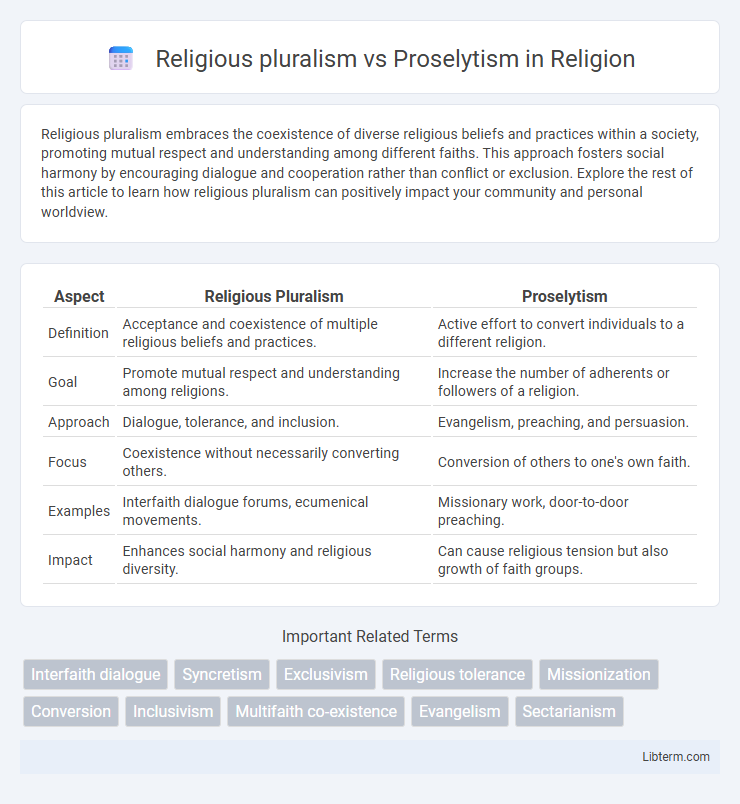Religious pluralism embraces the coexistence of diverse religious beliefs and practices within a society, promoting mutual respect and understanding among different faiths. This approach fosters social harmony by encouraging dialogue and cooperation rather than conflict or exclusion. Explore the rest of this article to learn how religious pluralism can positively impact your community and personal worldview.
Table of Comparison
| Aspect | Religious Pluralism | Proselytism |
|---|---|---|
| Definition | Acceptance and coexistence of multiple religious beliefs and practices. | Active effort to convert individuals to a different religion. |
| Goal | Promote mutual respect and understanding among religions. | Increase the number of adherents or followers of a religion. |
| Approach | Dialogue, tolerance, and inclusion. | Evangelism, preaching, and persuasion. |
| Focus | Coexistence without necessarily converting others. | Conversion of others to one's own faith. |
| Examples | Interfaith dialogue forums, ecumenical movements. | Missionary work, door-to-door preaching. |
| Impact | Enhances social harmony and religious diversity. | Can cause religious tension but also growth of faith groups. |
Understanding Religious Pluralism: Core Principles
Religious pluralism recognizes the coexistence of diverse religious beliefs and practices, emphasizing respect, dialogue, and mutual understanding among different faiths. Its core principles include acceptance of religious diversity, commitment to peaceful coexistence, and the promotion of interfaith cooperation without efforts to convert others. This approach contrasts with proselytism, which seeks to actively persuade individuals to adopt a particular religion, often prioritizing conversion over mutual respect.
Defining Proselytism: Mission and Methods
Proselytism involves actively seeking to convert individuals from one religion to another through mission-driven efforts such as preaching, distributing religious literature, and personal evangelism. Its methods often emphasize persuasion and direct engagement, aiming for clear, measurable conversion outcomes. Religious pluralism recognizes and respects the coexistence of diverse faiths without attempting to change individual beliefs, contrasting sharply with the proactive nature of proselytism.
Historical Roots of Religious Pluralism
Historical roots of religious pluralism trace back to ancient civilizations such as the Maurya Empire in India, where Emperor Ashoka promoted tolerance among diverse faiths, and the Hellenistic period, which saw the coexistence of various religious traditions in the Mediterranean. The concept of pluralism further evolved in the Middle Ages with the interactions between Islam, Christianity, and Judaism, particularly in regions like Al-Andalus, fostering an environment of intellectual exchange and relative tolerance. These historical instances highlight how religious pluralism arose from cultural encounters and political policies encouraging coexistence instead of proselytism.
The Evolution of Proselytism Across Religions
Proselytism has evolved significantly across religions, shifting from aggressive conversion tactics to more dialogue-based approaches that respect religious pluralism. Historical practices in Christianity and Islam emphasized mass conversion, often through missionary work or conquest, whereas contemporary efforts emphasize interfaith understanding and voluntary acceptance. This evolution reflects broader societal shifts toward valuing diversity and mutual respect among different faith communities.
Ethical Implications of Religious Pluralism
Religious pluralism promotes mutual respect and coexistence among diverse faiths, emphasizing ethical principles of tolerance, dialogue, and understanding. Proselytism raises ethical concerns related to coercion, manipulation, and respect for individual autonomy in matters of belief. Balancing these approaches requires careful consideration of human rights, freedom of conscience, and the moral imperative to affirm diversity without imposing conversion.
Proselytism and Freedom of Belief
Proselytism involves actively attempting to convert others to a particular faith, which can challenge the principle of freedom of belief by imposing pressure on individuals to change their religious identity. Religious pluralism upholds the coexistence of diverse faiths, emphasizing voluntary choice without coercion, thereby protecting individual autonomy in spiritual matters. Ensuring freedom of belief requires balancing proselytism practices with respect for pluralism, preventing manipulation while allowing the expression of religious convictions.
Social Consequences: Pluralism vs. Proselytism
Religious pluralism fosters social harmony by encouraging mutual respect and coexistence among diverse faith communities, reducing intergroup conflicts and promoting civic engagement. In contrast, proselytism can generate social tensions and polarization, as aggressive conversion efforts may provoke resistance, mistrust, and a sense of cultural threat within targeted groups. The contrasting social consequences highlight pluralism's role in building inclusive societies versus proselytism's potential to deepen societal divisions.
Interfaith Dialogue: Bridging Pluralism and Mission
Interfaith dialogue fosters Religious pluralism by encouraging mutual understanding and respect among diverse faith communities, creating a foundation for peaceful coexistence. This dialogue serves as a bridge to mission-focused Proselytism by promoting empathetic communication rather than coercion, allowing believers to share their faith experiences authentically. Emphasizing common values and ethical principles enhances collaboration across religious boundaries while preserving each tradition's distinct identity.
Legal Perspectives on Religious Expression
Legal perspectives on religious expression vary significantly between religious pluralism and proselytism, with pluralism emphasizing the protection of diverse religious beliefs under constitutional rights. Courts often uphold religious pluralism by ensuring freedom of belief and worship without interference, while proselytism can face legal restrictions to prevent coercion or disturbance of public order. International human rights frameworks, such as the International Covenant on Civil and Political Rights, balance the right to propagate faith with limitations to safeguard societal harmony and individual freedoms.
Toward Mutual Respect: Reconciling Shared Spaces
Religious pluralism fosters mutual respect by encouraging coexistence and dialogue among diverse faiths in shared spaces, promoting peaceful interactions and understanding. Proselytism, focused on conversion efforts, can create tension in such environments by prioritizing belief change over harmony. Emphasizing inclusive practices and valuing religious diversity helps reconcile differences, allowing communities to thrive collectively without compromising individual religious identities.
Religious pluralism Infographic

 libterm.com
libterm.com